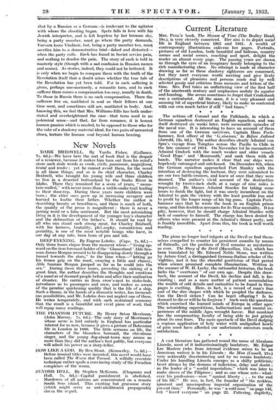* * * *
The actions off Coronel and the Falklands, in which a German squadron destroyed an English squadron, and was itself destroyed six weeks later, were memorable episodes of the naval war. It is interesting to have an account of them front one of the German survivors, Captain Hans Poch- hammer, first officer of the ` G.uisenau,' in Before Jutland (Jarrold, 12s. 6d.). The author describes clearly Admiral von Spee's voyage from Tsingtao across the Pacific to Chile in the late summer of 1914. On November 1st he encountered Admiral Credo& with the much weaker and older vessels ` Good Hope ' and ' Monmouth,' and sank them with all hands. The narrator makes it clear that our ships were hopelessly outranged and outclassed. On December 8th, when the German squadron approached Port Stanley with the intention of destroying the harbour, they were astonished to see our two battle-cruisers, and knew at once that they were doomed. The author's vivid account of the destruction wrought by twelve-inch shells at a range of nine miles is impressive. He blames Admiral Sturdee for taking some hours to finish the fight, but it was surely incumbent on the Admiral to gain the victory with the least possible loss and to profit by the longer range of his big guns. Captain Poch- hummer says that he wrote the book in an English prison camp, and thiS doubtless accounts for its War mentality. It is a pity, however, that he should charge Admiral Sturdee with lack of courtesy to himself. The charge has been denied by officers who were present at the Admiral's dinner party, and is frankly incredible. Apart from this, the book is well worth reading.






































 Previous page
Previous page